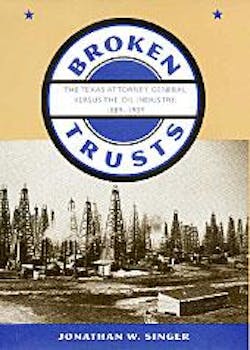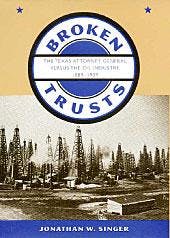Antitrust and Texas politics
Mergers and acquisitions are the key to the shrinking of the OGJ200 list of publicly traded US oil and gas producers, as profiled beginning on p. 70. This consolidation of the industry is concentrating assets among the top few companies-the integrated firms-and large independent operators.
Wary of the power of a few, large companies in any given industry engaged in interstate commerce, the US government in 1890 passed the Sherman Antitrust Act to prohibit the unreasonable monopoly of or restraint of trade. Sec. 7 of the Clayton Antitrust Act of 1914 prohibits mergers and acquisitions where the effect "may be substantially to lessen competition, or to tend to create a monopoly." Determining whether a merger will have that effect requires a thorough economic evaluation or market study, said the US Federal Trade Commission.
In 1889, the state of Texas enacted its own legislation, the Texas Trust Act. This act was primarily aimed at controlling the railroads and was a precursor to 1891 legislation that created the Texas Railroad Commission, which ultimately became the regulator of oil and gas production in the state.
Broken trusts
A new book by Jonathan W. Singer, "Broken Trusts: The Texas Attorney General versus the Oil Industry, 1889-1909," looks at the process of early antitrust enforcement and the oil industry in Texas. Published by the Texas A&M University Press, the book shows the motives and mechanisms of, as well as the public and political reactions to, attempts to control the industry from its beginning.
It's an examination of the efforts of the Texas attorneys general to enforce state antitrust laws in a series of cases against the petroleum industry during an era in which the state shifted from a predominantly agricultural economy to an industrial economy. During this period, Texas also transitioned from being simply a market for petroleum products-primarily lubricants and kerosine-to being a leading producer of them.
In "Broken Trusts," Singer said that in choosing how to handle big business in general and the oil in- dustry in particular, Texas had several options, including establishing regulatory agencies, en- acting and en- forcing more restrictive laws regarding corporations, and adopting and enforcing anti- trust statutes and policies.
"Texas chose to do all three, but antitrust enforcement received the most attention from state officials and from the public," Singer wrote. "Between 1889 and 1939, the Texas Attorney General's Department and county attorneys filed at least 14 antitrust and antitrust-related actions against oil companies."
Targeting Standard Oil
The primary target was Standard Oil Co., and in Texas, Standard Oil's main affiliate was the Waters-Pierce Oil Co. Singer examines cases against Ohio-based Standard Oil and Waters-Pierce and the resulting changes the companies implemented.
Singer said that political ambition played a major role in the decisions to prosecute these cases, but there was a real, underlying belief in the goals of antitrust policy. And during 1889-1909, federal enforcement of antitrust violations was limited.
This era also saw the decline of oil exchanges, which had been the chief price-setting instruments for crude oil. Once Standard Oil increased its direct purchases from producers, it decreased its purchases on the exchanges, Singer said. Sales volumes on the exchanges waned, and in 1895, Standard Oil an- nounced it would issue its own price quotations for crude based on what it thought the market price should be, rather than use the exchanges.
The end of the oil exchanges meant that it was no longer possible for independent refiners to buy oil on the open market. They had to either establish long-term contracts with reliable producers or else emulate Standard Oil by becoming at least semi-integrated.

